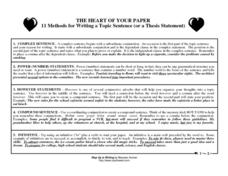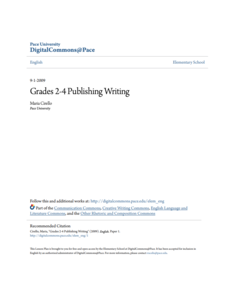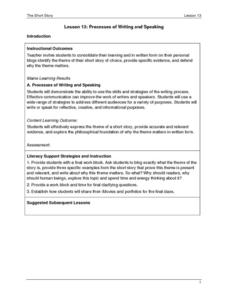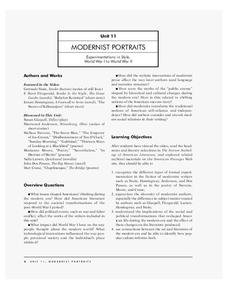Curated OER
The Heart of Your Paper: 11 Methods for Writing a Topic Sentence (or a Thesis Statement)
Help your young writers produce high-quality topic and thesis statements that go beyond basic wording and really illustrate complex ideas and critical thinking skills. From however and compound sentence statements to using...
Poetry4kids
How to Write a Concrete or “Shape” Poem
Writers compose an original shape poem. Scholars choose a subject to write about and create a visual representation by forming a corresponding picture using the poem's words.
Curated OER
Nonfiction Genre Mini-Unit: Persuasive Writing
Should primary graders have their own computers? Should animals be kept in captivity? Young writers learn how to develop and support a claim in this short unit on persuasive writing.
Bulgarian Creative Writing Competition
Creative Writing Prompts For Every Season and Month
Winter, spring, summer, and fall! Every season is covered in a 14-page list of writing prompts. Included are story starters, reflection questions, poetry topics, and more.
K12 Reader
Something I'd Like to Learn
It's no secret, writing is a lot more enjoyable when it's about something we care about. This simple exercise engages children in producing original writing, while allowing them to share their personal interest with others.
K12 Reader
My Favorite Subject
Reflect on your favorite subject in school with a straightforward writing prompt. Kids think about what subject they enjoy the most, why they enjoy it, and if everyone should study the subject in the space provided on the page.
Core Knowledge Foundation
Unit 4: The Renaissance
The Renaissance is the theme of a five-week unit designed to boost reading comprehension, spelling, vocabulary, and expository writing skills. Scholars listen to and discuss daily readings and engage in skills practice activities...
Pace University
Publishing Writing
Scholars become familiar with tagline literature with the help of the story, Alexander and the Horrible, No Good, Very Bad, Terrible Day by Judith Viort. After a read-aloud and whole-class discussion, leveled groups complete...
Berkshire Museum
Nature Journaling: Experience the Outdoors Through Writing and Drawing
Step into the great outdoors and develop young scientists' skills of observation with a nature journaling lesson. Given a specific focus or goal, children practice making and recording observations of nature through written descriptions...
Curated OER
School Year Reflections
The end-of-year period is a great time to pause and reflect on the experiences that made up the school year. Let the reflecting begin with a worksheet that prompts scholars to think back and respond with important lessons...
College Board
2015 AP® Physics 2: Algebra-Based Free-Response Questions
As one of the few AP tests that count for second year college course credit, the AP Physics 2 exam requires a higher level of knowledge than most. Help young scientists study for their upcoming AP Physics 2 exams with previous...
Jordan School District
Who is Worth More Than Gold?
Young writers compose an opinion piece that details who they feel is worth more than gold.
EngageNY
End of Unit Assessment, Part 1: On-Demand Essay “What Makes A Hurricane A Natural Disaster?”
It's time to refine writing and word choice. Learners work on Part 1 of their end of unit assessment by creating an essay titled What Makes a Hurricane a Natural Disaster? They use glossaries and graphic organizers from previous...
Seussville
What Can Your Class Do?
Inspire scholars to do their part for planet Earth with a read-aloud of Dr. Seuss's The Lorax, and variety of activities designed to boost the environmental activist in us all. Activities include writing poems about the Earth,...
Reproducible Master
Reader’s Journal
As you read a story or novel, have your class members put together and fill out a journal. They will have the chance to illustrate a cover page, draw and write about various topics, respond to a focus questions, and draft a paragraph.
Curated OER
Transformations in the Coordinate Plane
Your learners connect the new concepts of transformations in the coordinate plane to their previous knowledge using the solid vocabulary development in this unit. Like a foreign language, mathematics has its own set of vocabulary terms...
Chicago Botanic Garden
Causes and Effects of Climate Change
Wrap-up a unit on global climate change with a activity that examines the causes and effects of climate change. Learners fill out a chart that represents what they think causes climate change—natural and human-based—and what they think...
Maine Content Literacy Project
Processes of Writing and Speaking
As this short story unit comes to a close, provide a day for a full examination of theme and allow some time in class for individuals to work on their various assessments. This final lesson plan before presenting iMovies and portfolios...
Bully Free Systems
Bully Free Lesson Plans—Sixth Grade
Two lessons stress the importance of keeping your classroom bully-free. Discussion, collaborative work, role-play, and writing allows participants to examine whether their classroom is welcoming to new members and decide what they should...
Literacy Design Collaborative
In Pursuit of Happiness
What ideas and philosophies guided the Transcendentalist movement in America? Scholars explore the topic, reading texts by Ralph Waldo Emerson and Henry David Thoreau. Additionally, they write essays comparing the authors' structural...
Curated OER
The Rumpelstiltskin Story
Why didn't Rapunzel's hair stop growing? Why did it take the fairy godmother so long to intervene in Cinderella's affairs? Young writers consider unanswered questions like these and compose news articles investigating the true...
National Endowment for the Humanities
Cultural Change
High schoolers research the passage of the 19th Amendment as an illustration of the mutual influence between political ideas and cultural attitudes. They also read the Seneca Falls Declaration and explore the cultural shifts it both...
Annenberg Foundation
Modernist Portraits
How did literature reflect people's attitudes in post-World War I America? A lesson explores the topic using a variety of activities. Individuals watch and respond to a video; read author biographies and engage in discussion; write...
Student Handouts
Four Things I Learned About...
Thinking about what they have just learned with a short reflection worksheet. Kids note four things they have learned in small frames after writing the topic at the top of the page.























